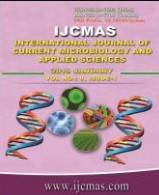


 National Academy of Agricultural Sciences (NAAS)
National Academy of Agricultural Sciences (NAAS)

|
PRINT ISSN : 2319-7692
Online ISSN : 2319-7706 Issues : 12 per year Publisher : Excellent Publishers Email : editorijcmas@gmail.com / submit@ijcmas.com Editor-in-chief: Dr.M.Prakash Index Copernicus ICV 2018: 95.39 NAAS RATING 2020: 5.38 |
Diamondback moth, Plutella xylostella is a major pest of cruciferous crops worldwide and it has developed resistance to almost all synthetic insecticides. It was known to harbour microorganisms which play important role in growth and development of the host. In the present study bacterial strains were isolated from third instar larvae of P. xylostella collected from Sugatur, Kolar District of the state Karnataka. Morphological and Biochemical characterization were done, among them most of the bacterial isolates were gram negative and negative for some biochemical tests. Further, total bacterial genomic DNA was extracted from the bacterial isolates and amplified using PCR with 16S rRNA primers (expected size 1000 bp). Ten different bacterial isolates were isolated and five were identified at genus level such as Serratia marcescens (DBM1 and DBM9), Serratia nematodiphila (DBM2), Serratiasp. (DBM3) and Myroidesodoratus (DBM4). The Serratia spp. is the most predominant bacterial isolate in this region. These studies suggested that a combination of molecular and traditional culturing methods can be effectively used to analyze and determine the diversity of gut microflora. These bacterial strains may play important roles in growth and development of P. xylostella.
 |
 |
 |
 |
 |